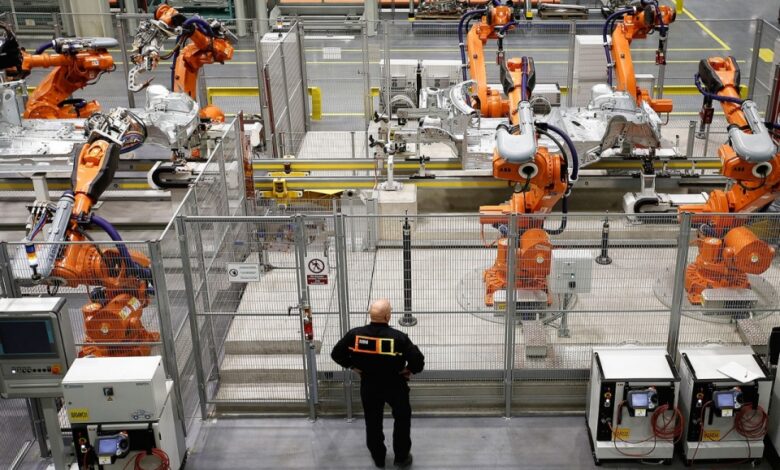Trump will bring jobs back from Mexico — to be replaced by robots


After a canceled meeting followed by a phone call with President Trump, Mexican leader Enrique Peña Nieto should send the new president a gift: two new studies that show the U.S. president’s claim that he will “make America great again” by bringing jobs back from Mexico is a nationalist-populist hallucination.
If these jobs ever come back — a big if — the vast majority of them will be replaced by robots.
On his first day in the White House, Trump signed an executive order to renegotiate the NAFTA free trade deal with Mexico and Canada, and to kill the Trans-Pacific Partnership trade deal between the United States and 11 other nations, including Japan, Mexico, Peru and Chile.
“We will bring back our jobs, we will bring back our borders,” Trump said in his Jan. 20 inaugural speech. “We will get people off welfare and back to work, rebuilding our country with American hands and American labor.”
All of that sounds very nice, except that it’s based on false premises. What’s worse, it risks hurting most Americans’ pocketbooks — and much of the rest of the world’s — for the sake of Trump’s political base of displaced workers from dying industries in a handful of Midwestern states.
Trump claims that the United States has a huge unemployment problem. In fact, the opposite is true: overall U.S. unemployment has gone down from 10 percent in 2009 to 4.8 percent today, one of its lowest levels in history.
Trump is right that manufacturing unemployment has declined, hitting states such as Ohio and Pennsylvania, which were crucial to Trump’s election victory in the electoral college. But the inconvenient truth that Trump is not mentioning is that manufacturing employment accounts for only 9 percent of overall U.S. employment.
A soon-to-be released study by the Center for Business and Economic Research at Ball State University (CBER) says that 88 percent of U.S. manufacturing job losses in recent years were due to technological change — mostly automation — and not because of trade with Mexico or China. It mirrors the conclusions of a previous 2015 CBER study.
Asked about Trump’s claim that he will bring jobs back from Mexico by renegotiating NAFTA and applying a 35 percent border tax to Mexican imports, CBER director Michael J. Hicks told me that “the possibility that these jobs will come back seems terribly unlikely.”
He added: “What is far more likely is that American companies will produce in the United States, but will do so with a more automated workforce.”
And if Trump goes ahead with his proposed border tax on Mexican imports, “both North Americans and Mexicans will be worse off. We will pay more for goods in both countries,” he said.
A separate new study from the McKinsey Global Institute says that 60 percent of U.S. manufacturing jobs are likely to be partially or entirely automated in coming years.
At first sight, that sounds alarming. But it’s just a continuation of what been going on for several centuries: as technology advances, people move from old to new jobs.
While farm employment accounted for 40 percent of overall U.S. employment in 1900, it had fallen to 2 percent of U.S. employment in 2000, the McKinsey study says. And the share of manufacturing employment went down from about 25 percent in 1950 to 10 percent in 2010.
Meantime, employment in service areas and technology has soared, which explains today’s relatively low overall unemployment rates.
My opinion: Trump’s move to kill TPP and renegotiate NAFTA is a political, not economic, plan. He wants to solidify his base in Ohio, Pennsylvania and Illinois — which are critical for him to be reelected in 2020 — by trying to artificially resurrect jobs that in most cases will be replaced by robots, instead of re-training people to work in the industries of the future.
In the process, he may make all U.S. consumers pay more for cars, refrigerators and virtually everything else. The overwhelming majority of Americans who are not displaced manufacturing workers will be paying a very high price for the 70,000 votes Trump won in Midwestern states that delivered him the election. It may be good for Trump, but it’s bad for Americans.





